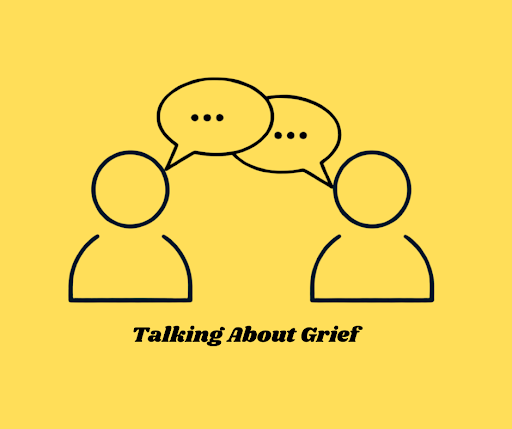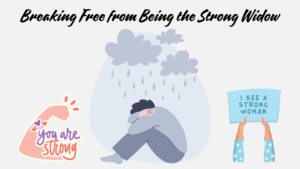As we continue our Grief is Genuine Despite the Questions series, we’re focusing on the “Talking about it” questions you may encounter. These questions range from curiosity and kindness to downright painful or judgemental. Remember, it’s often the other person who is uncomfortable or trying to be supportive versus. any reflection of you and your grief. They may be struggling in their own way and this is their way of handling their emotions along with yours.
As we both grieved our spouses, these questions came up. Some people were obviously avoiding talking about the loss of him. It seemed that they didn’t want to make us sad by talking about him. Others were seemingly uncomfortable with us wanting to share and tell our stories. There is no right or wrong way to go about talking about our loss. You will know what is right for you and your situation.
Part of grief processing includes talking about our loss and our feelings about it. Talking about them, what happened and sharing stories of them may provide us comfort and healing. This is an important part of grief and demonstrates that we are moving forward. Sharing stories can indicate we’re no longer stuck in our grief but we are healing.
A set of talking about it questions are noted below. You may encounter these or something different. We’ve included some possible responses you can offer to those questions. You always have a choice if you respond and how you respond to questions. You don’t have to answer them or justify your grief. Remember, this is YOUR journey.
Talking about it questions:
Is it OK to talk about them with you?
Many people will try to avoid talking to you about your spouse because they don’t want to upset you. What many do not realize is that when they avoid talking about your loved one, it is as though they are ignoring that they existed. Many who are in grief would prefer that you share your stories. Sharing your stories about their loved one demonstrates that they were important to you as well.
Recently, Jeni was at a family event and her sister-in-law mentioned that she missed Bob at this particular event because whenever the family gathered, she and Bob would go off on their own and poke fun at everyone else. The sharing of this memory made Jeni smile as it also brought up memories of his pranks and reminded her that others still miss him as well.
A potential response depends on you and how you feel about it. If you’re open to talking about them, share that you are and let them know it’s OK. If you’re not up for this, please let them know. You could say, “Not right now, I’m not ready.” or “I’d love to but now isn’t a good time.”
Why do you keep talking about it?
We are in a fix it world. People want to fix the situation and move on to something else. Grief makes people uncomfortable and they want us to be happy. We keep talking about it because our loved one was important to us. It is a cherished part of our life and even though they are no longer with us, they are still part of our story. It’s also an important part of the grieving process and sharing our stories helps us to move forward.
A reply to this question could be: “I talk about it and them because it helps me process my grief.” or “I’m hearing you are uncomfortable with me talking about this.” or “Are you open to hearing about it?, if not, I can talk to someone else.”
Have you considered getting professional help?
This can come from a place of genuine concern and care. It could also be coming from a not so supportive perspective. Teresa had a well meaning family member ask her this question. They were concerned about her financial well-being, not precisely about her mental health.
Getting supportive professional help and working through your grief can be a great help to you and your family. If you are having trouble in your grief journey, by all means getting help is a great step and a brave step. However, just because you are grieving, it does not mean that you have to. The choice is yours to make. Your well-being and mental health are important – please take time to prioritize this on your journey.
With grief you may feel sad, depressed and everything in between. Remember, this is part of the grief journey. This is a normal part of the process. If you begin to feel stuck and unable to move ahead, it may be time to seek professional help. Make sure to reach out when you feel you may need some assistance.
A way to respond could be: “Thank you for your concern, I will look into it.”, “What is concerning you that I might need professional help?”, or “What sort of professional help are you referring to?”, or “Do you have a recommendation?”
Thoughts of suicide – Get help immediately – call 988 or visit https://988lifeline.org/
Why are you still upset about it? Why not try to be a little happier? Aren’t you tired of being sad?
These questions are often a reflection of the other person’s discomfort or desire for you further along your grief journey. It’s that Fix it type of question we spoke about earlier..They often want the “old” you back and for you to be happy again.They don’t realize that this event changed everything for you.
Someone asked Jeni when they would be over the grief. Jeni’s response was that Bob would always be gone, so she would always have a part of her that would miss him. While she would heal and not be in the depths of grief, Bob will always be part of her story and part of her heart. This may be true for you. Depending on where you are in the grief journey, your level of emotions may be high or low. Your person will still be a part of your story.
A potential response could be “I am still processing my grief.”, or “Yes, I’m tired of being sad too, and I am grieving the loss, it’s a challenge.” or “What do you suggest?” – if you want to hear what they might have for ideas, or you could just not respond.
What do you think your spouse would want? Would they want you to be this way?
We may consider what we think our loved one would want, and it’s nobody else’s business how we live our life. What they want or wanted may not be relevant. We often struggled with this sort of question. We wanted to honor and respect our loved one, and we still had to move forward and forge a new life without them. You will have to make your own decisions based on the relationship you shared with your loved one and the life you get to create now.
In some of Jeni’s anger stages, she cut her hair and bought a Honda (Bob was a Chevy guy) because she was mad at him for dying. When asked, “What would Bob think?”, her response was “If he is mad about it, let him come back and tell me.”
While we know this is not possible, we also should realize that we have to live our life. As we no longer have someone to share the responsibilities and life’s questions, we have to make the best decisions we can at this point in our life.
Replying to this one can be tricky and potentially triggering. Pause before you reply. Consider if or how you might reply. Some potential replies are: “I’m grieving their loss.”, “I’m doing the best I can.”, “That feels like a ____(fill in the blank) question.”, or “I’m focusing on taking care of myself and family at this time.”
Know that you’re doing the best you can and that is enough.
In this series of questions, we’ve focused on talking about it. Our next article will explore other questions and possible responses to the many questions we get asked. If you have any questions you have received that you would like us to work through, please let us know.
Regardless, know that your grief is genuine and you have the right to choose how and when you talk about it. Remember that talking about it and them is an important part of the process. This is your grief journey.
Peace & blessings to you.
Teresa & Jeni
PS: For additional support, you can download our free copy of 10 Ways to Move Forward After Loss
The First Days: Coping with Life After Loss is a resource for the first days after a loss – available on Amazon in paperback.
My Journey as a Widow: A Widow’s First Journal is a follow-up journal for processing complex emotions and moving forward with hope. It is available in paperback on Amazon.
Follow us on Social Media:
Facebook: https://www.facebook.com/TornInHalfwidows/
LinkedIn: https://www.linkedin.com/company/torn-in-half/




